- Home
- Kara Jaynes
Twisted Enchantment (Unbreakable Force Book 5)
Twisted Enchantment (Unbreakable Force Book 5) Read online
Twisted Enchantment
~ Unbreakable Force Series Book 5~
by Kara Jaynes
To my mom. You taught me there is no fiercer or more tender love on this earth than that of a mother for her child.
Table of Contents
Chapter 1
Chapter 2
Chapter 3
Chapter 4
Chapter 5
Chapter 6
Chapter 7
Chapter 8
Chapter 9
Chapter 10
Chapter 11
Chapter 12
Chapter 13
Chapter 14
Chapter 15
Chapter 16
Chapter 17
Chapter 18
Chapter 19
Chapter 20
Chapter 21
Chapter 22
Chapter 23
Chapter 24
Chapter 25
Chapter 26
Chapter 27
Chapter 28
Chapter 29
Chapter 30
Sneak Peek of Book 6: Final Enchantment
About the Author
1
Adaryn
Aaric sighed, rubbing his eyes tiredly. “Bran was right,” he grumbled. “We should have waited until spring.”
Snow fell—it had been for the past three days—and twilight was coming on fast. Our horses were knee-deep in the slushy snow, and looked nearly as miserable as Aaric did. I sighed, irritated. “I didn’t want to spend any more time there than we had to,” was all I said as I guided my brown mare, Sorrel, through the icy drifts.
Aaric snorted. He didn’t share my weariness of cities and their politics. I didn’t point out that he’d initially seemed just as eager as I to leave; he had shown immense curiosity about the potential countries and cultures beyond the mountains. His enthusiasm, however, waned with every day of travel in the snow. We’d made good time crossing the mountains, and were now traveling in a sparse wooded forest, some miles east.
“You know what sounds delicious?” Aaric sounded mournful.
“White bread?” I suggested. I knew what he was going to say, but teased him anyway. “Roast duck? Turkey stuffed with—”
“Coffee,” Aaric said loudly, with a scowl in my direction. “Piping hot coffee.” We’d run out weeks earlier.
“Don’t get too attached to the idea,” I pointed out. “What if these lands have never heard of coffee?”
Aaric’s eyes widened in what could only be described as near panic. I half expected him to turn back right there and then. I put my hand out consolingly. “It’s a joke, Aaric, calm down. There’s almost certainly coffee.”
He still looked a little wide-eyed, but continued to follow me down the slope. We had to find shelter soon, or risk a horse breaking its leg in the dark.
I peered ahead in the deepening gloom. There. Through the trees was a faint glow. I thought I might be imagining it, but as we rode through the woods the glow grew to become a lamp, shining from the kitchen window of a cottage. Aaric and I shared a grin. We hadn’t seen another human since entering the mountains.
We eagerly urged our horses to the small homestead. A dog frantically barked from the barn, warning the owners of our arrival. Aaric dismounted and helped me down from Sorrel, and together we walked up to the front door. Aaric knocked and stepped back. I stood behind him.
We heard shuffling footsteps approach, and the door opened a crack. “Who’s there?” a man’s voice asked.
“Two weary travelers, sir,” Aaric said. “We’ve been traveling for some time and are in need of a place to sleep and food to eat. We can pay.”
“Who’s your companion?” The door didn’t open further. If anything, the man sounded even more suspicious.
“My wife, sir.”
The door did open then. A man and a woman stood in the doorway, a cluster of young children peering at us from behind them. The woman held the lamp up to get a better look at us, and made a soothing sound when she saw me. “You poor dear,” she said. “You two will catch your deaths out in the cold like this.”
The farmer hesitated only a moment before opening the door to allow us entry.
The house was warm, deliciously so. A fire crackled in the hearth, and the aromas of baked bread and chicken filled the room. Children seemed to be everywhere I looked, crawling on furniture or hiding behind their mother’s skirt.
“Eight,” the woman said proudly, “and the oldest only twelve.”
After the horses were put in the stable, silver was passed to the farmer, and Aaric and I were seated at the table. Hot bread, chicken, and some root vegetable I didn’t recognize were given to us on tin plates and we dug in.
Dinner was a cheerful affair, the farmer’s wife and children chattering nonstop. They talked about everything: the weather, the family dog, the neighbor—who lived five miles away—and everything in between. The farmer occasionally got a word in edgewise, but for the most part was content to sit back and let his wife do the talking.
It was pitch black outside now. The fire crackled merrily, filling the home with a flickering light and homey feel.
“So where are you two from?” the farmer asked when his wife paused for breath.
“Ruis,” Aaric replied, using his bread to soak up the chicken juices left on his plate.
“Where’s that?” the man asked, puzzled. The children watched us, big eyes shining in the firelight.
“It’s over these mountains,” Aaric flapped a hand in the general direction of our city. “It’s quite far. We’ve been traveling for several weeks already.”
“Over these mountains?” The farmer looked impressed. “They’re near impassable. I’m surprised you two made it.”
Aaric shrugged. It had been difficult. There were times when there wasn’t much of a path, if any, and the going was slow, but we’d persisted, and had come through. A party much larger than ours would have a hard time of it though.
The farmer scratched his chin. “Now that I think of it, my grandfather left me a map of the lands beyond the mountains. Let me see if I can find it.” He stood and walked over to a large chest, and after rummaging through it procured a worn scroll. He rolled it open on the table and leaned over it, eyes squinting in the dim firelight.
“Here, let me help.” I called up the magic, and a small ball of soft light appeared in my hand.
The reaction I received was not at all what I expected. The farmer fell backward out of his chair with a startled yell, and the children screamed in shrill terror. The mother started weeping. “Please don’t hurt us!” she wailed. “Don’t take the children, they’re only babies.”
Aaric and I stared at them in confusion. “It’s . . . just a light,” I said, perplexed. “It won’t hurt you.”
The farmer stared at me in horror. “You’re one of the Twyli,” he whispered. His face hardened in determination, though stark fear showed in his eyes. “I won’t let you take my children. I won’t!” He stood and pointed a shaking finger to the door. “Get out.”
“What?” Aaric sputtered. “Speak sense, man. What in blazes is a Twyli?”
“Are you one too?” the man said turning to him, hands balled into fists. “What kind of sick, twisted game is this you’re playing, pretending to be a Denali?”
Aaric’s face was so bewildered I would have doubled over laughing in any other situation. As it was, I felt ill; the children were scared out of their minds. Five of them clutched their mother’s skirts like a lifeline, sobbing. The older three were trying to be brave, but their faces were ashen, their eyes wide.
I stood, placing a hand on A
aric’s shoulders. I wanted to know what was going on, but these people were in no state to answer any questions. “We need to leave.”
Aaric’s face twisted in indecision. He clearly wanted some questions answered, but he could also see these weren’t the people to ask. He nodded curtly, and rose. The family leaned away from us as we did so.
“We won’t hurt you,” I said soothingly, but their terror-filled expressions didn’t change. I sighed and followed Aaric outside.
2
Adaryn
“What was that all about?” Aaric lay on some fur blankets, one hand behind his head. “And what’s a Twyli? Or a Denali, for that matter?”
I lay next him, my head on his chest. We had traveled a short way from the house, despite the fact that it was completely dark out, and set up camp among the trees. We’d pitched the tent together, packing our gliders and provisions inside. I started a small fire after that. I watched it now, the sparks and flames licking the small bit of wood I’d gathered. The smoke left by way of the small opening in the top of the tent.
“They looked so scared,” I whispered, thinking of the children. My heart stung at the memory.
Aaric patted me on the shoulder. “It wasn’t your fault,” he said soothingly. “We couldn’t have known they’d react in such a ridiculous fashion.” He paused, and when he spoke again, I could hear the puzzlement in his voice. “Perhaps they’ve never heard of magic out here. That is a possibility.”
“But why call me a ‘Twyli?’” I asked, trying to reason out the family’s behavior. “It doesn’t make sense.”
“They didn’t make sense,” Aaric replied.
“They were terrified for their children,” I added sadly. “Like I was going to hurt them.”
“Don’t worry about it,” Aaric yawned. “We’ll get some answers as we travel on, I’m sure.”
I lifted my head to look at him. His eyes were closing, heavy with approaching sleep. I mentally shrugged. It seemed as good a time as any to give him the news.
“I’m pregnant.”
Aaric sat bolt upright, his eyes opened so wide they looked ready to pop out of his head. I laughed, and pushed him back down. “Don’t act so surprised.” I smiled. “You had to know this was coming.”
“How long have you known?” All traces of sleepiness were gone, replaced with a look of awe as he gazed at my belly, which, as far as I could tell, didn’t look any different. Yet.
“A few weeks.” I snuggled up to him, hugging him to me. He smelled like wood smoke and dirt, the scent of coffee almost gone.
He placed a hand tenderly on my stomach. “I’m going to be a father.” I heard a hitch in his voice, and looked up into his large gray eyes to see unshed tears in them. He was smiling, and touched his nose to mine. “You have no idea how happy that makes me, Adaryn.”
“I’m happy too.” I kissed him, feeling my body tingle at his nearness. He drew me to him, kissing me back. Life in that small moment couldn’t be more perfect.
3
Aaric
The next few weeks slid by uneventfully. They continued traveling, but Aaric insisted they move slowly and stop sooner than normal for the night. He wanted to make sure Adaryn was getting plenty of rest and not overtaxing herself. He watched her carefully when she ate—it wouldn’t do to starve the baby. She kept giving him long suffering looks of patience, but he couldn’t for the life of him figure out why.
The sparse forest stretched on, getting thicker the farther east they went. The skies had cleared, thankfully, and cottages and farms were seen more frequently. Aaric suggested more than once they stop and ask to stay for the night, but Adaryn insisted they avoid everyone until they got to a village.
A month after leaving that first homestead, they came to one. It was a small cluster of houses, some with thatched roofs, some with tile. In the afternoon light, wood smoke rose from the chimneys, and people, wrapped in thick coats and scarves, bustled about their business. Those who saw Aaric and Adaryn stopped to gawk for a moment before the cold drove them back to their work.
Close to the center of the village was a dilapidated old inn. The sign was so faded Aaric couldn’t make out the name of it. He carefully helped Adaryn down from Sorrel and tied the reins to the porch railing. He helped her inside, insisting he hold her hand. He was worried she might slip on the icy steps.
Adaryn pulled her hand from his irritably. “I’m not an invalid, Aaric.”
Aaric looked at her, confused. “I know that.”
She rolled her eyes and marched inside. Aaric followed, perplexed.
The interior was as dingy as the exterior. Paint peeled from the walls, the tabletops were dirty, and the floor unswept. Adaryn looked at it disapprovingly. “It looks like a blind man cleaned this room.”
Aaric agreed, and was about to say so when the innkeeper walked in from a back room. She was a short woman, rail thin with gray hair pulled back into a bun so severely it looked painful. She looked at the two of them with black, beady eyes and then smiled. It looked more like a grimace. “May I help you?”
“A bedroom, please. The best you have,” Aaric said. He glanced worriedly at his wife. She was looking a little pale. “And something to eat.”
The little woman nodded and led them up a flight of stairs that creaked and groaned alarmingly with every step.
Their room didn’t look much cleaner than the common room. The floors were filthy and the furniture dusty. Aaric almost swallowed his tongue when the innkeeper told him the price for room and board, but he forked over the silver anyway. Even a dirty room was better than sleeping outdoors. Maybe.
After the woman left, Aaric went back downstairs to see to the horses. On returning, he found Adaryn fast asleep on the bed. He smiled, his heart swelling as he gazed down at the nomad woman. She looked fragile, but Aaric knew her better than that. Adaryn had a strong spirit and a will of steel. His smile gave way to a frown as he continued watching his wife. He worried about her. They needed to find a place to settle down, and soon. Adaryn didn’t seem concerned with traveling, but that didn’t seem safe or proper, given her condition. He looked around their shabby room. This inn would hardly do, and he wasn’t sure about living in such a small village, but he resolved to ask questions and get to the nearest city as soon as possible.
4
Adaryn
Dinner looked terrible and smelled even worse. Peas and boiled bits of meat swimming in a bowl of greasy gravy made my stomach turn. The bread was over-baked and hard as a rock. I nibbled a little at the bread, but pushed my bowl of gravy over to Aaric. He protested.
“Adaryn, you need to eat. Think of the baby.”
I shook my head. “It looks nasty. I can’t.” The feeling of nausea grew.
“Just try it. It’s not as bad as it looks. One bite. If you don’t like it, you don’t have to finish it.”
I glowered at him. “You sound like my father.”
He smiled. “Well, I’m going to be one soon.”
I took my fork and spearing a pea out of the gray, gelatinous mess, put it to my lips. My stomach roiled in rebellion. I clamped a hand to my mouth and stood hastily. I was going to throw up. I thought of the chamber pot, but none of the serving maids had emptied it yet, so I opened the door and ran down the hall, down the stairs and out the common room door, heedless of the villagers gathered at the tables.
I made it just in time. I emptied the contents of my stomach, and then some, off the side of the porch on my hands and knees. My head pounded. I sat back on my heels, wiping my mouth with the back of my hand. I felt awful.
A ripple of enchantment touched my consciousness, and I turned, surprised. I couldn’t see anyone in the darkness, but the magic was there. I stood on shaky legs, peering into the gloom. It was snowing again, and the lights of the inn didn’t shine very far. The magic faded. I waited. Nothing.
I shrugged, about to go inside, when a shrill scream split the air. Heart beating fast, I spun around, fumbling inside myself for
my magic. It roared to life, crackling around me in its intensity. I sent a shower of glittering white-hot sparks into the air, lighting the night sky around me. Several dark figures were dashing in between houses, some carrying what looked like bundles over their shoulders. One such figure stepped out of a house close to the inn—a man, from the height and build—and my breath caught as I saw that the bundle he held was a child.
A woman dashed out of the house after the figure, blood on the side of her face. “Stop! Give her back! You can’t take my daughter!”
The dark figure turned. Magic radiated from him, and with outstretched fingers, he slammed a sheet of blue lightning into the woman. She slumped to the ground. I wasn’t certain she’d survived that amount of magic, but I wasn’t going to stand around and let mysterious strangers murder and kidnap. I summoned the magic, forming it into a shimmering sword. I charged the man, yelling at the top of my lungs, hoping the sound would alert more villagers to their plight.
The man was not expecting an attack. He started in surprise and had to leap out of the way to avoid my onslaught. He tossed the child in the snow. She lay there, unmoving. The man and I circled each other. He’d called up his own weapon—a long, cruel blade of flickering yellow flame. The shimmering sparks I’d thrown into the sky were fading, but between that and the light from the open cottage door, I saw his face, and almost lost my hold of the magic in surprise. His eyes were yellow, glowing like that of a feral animal. At the moment, his were as wide as my own must be.
“You’re one of us.” His voice was deep, and filled with incredulity. There was something vaguely familiar about him, but I was sure I’d never seen him before. “Yet you defend the Denali. Why?”
“Why do you steal children?” I asked, my voice shaking with rage. “For slaves?”
He lowered his sword and it winked out of existence. “We don’t have need of slaves. I need essence.” He pointed east. “Come to the city of the Twyli, strange one, and we will teach you. Come to Twyarinoth.”

 Shadows Grow
Shadows Grow Stars Descend (A Game of Stars and Shadows Book 1)
Stars Descend (A Game of Stars and Shadows Book 1)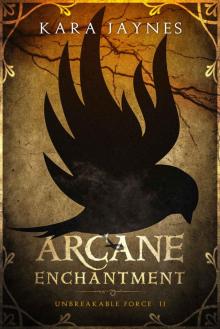 Arcane Enchantment (Unbreakable Force Book 2)
Arcane Enchantment (Unbreakable Force Book 2)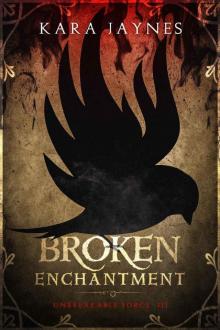 Broken Enchantment (Unbreakable Force Book 3)
Broken Enchantment (Unbreakable Force Book 3)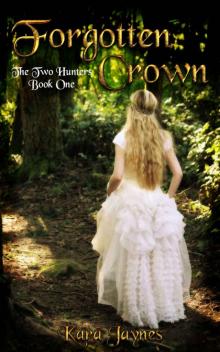 Forgotten Crown (The Two Hunters Book 1)
Forgotten Crown (The Two Hunters Book 1)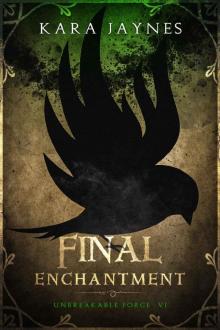 Final Enchantment (Unbreakable Force Book 6)
Final Enchantment (Unbreakable Force Book 6)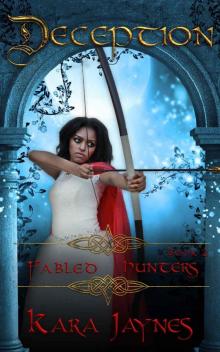 Deception (Fabled Hunters Book 2)
Deception (Fabled Hunters Book 2)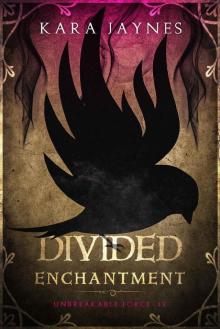 Divided Enchantment (Unbreakable Force Book 4)
Divided Enchantment (Unbreakable Force Book 4) Forbidden Light (The Two Hunters Book 2)
Forbidden Light (The Two Hunters Book 2)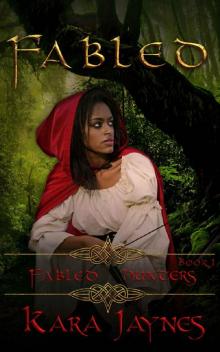 Fabled (Fabled Hunters Book 1)
Fabled (Fabled Hunters Book 1)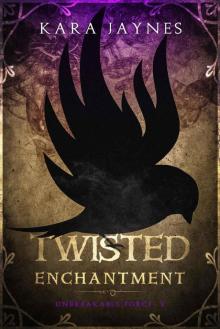 Twisted Enchantment (Unbreakable Force Book 5)
Twisted Enchantment (Unbreakable Force Book 5)